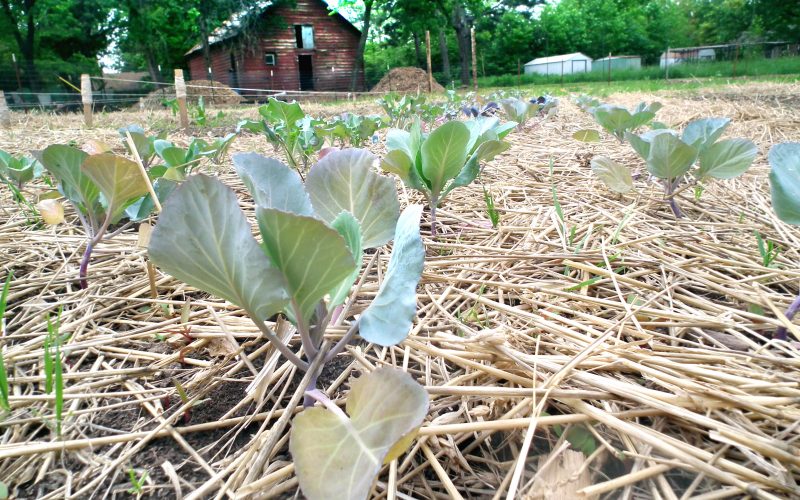
Courtesy Photo: During late February of this year, volunteers worked plots that will yield various foods in upcoming months.
z
Growing food, growing farmers
Don Bennett wears jeans with suspenders, complemented by heavy work boots. Sitting under the tree line across from the plots of Tri Cycle Farm, he speaks in layers of knowledge, of vision, of searching.
On this April day, produce — potatoes, radishes, kale — are beginning to emerge from the soil. A fence lined with lightweight wire encircles the crops, a necessary defense from the groundhogs and rabbits that roam the field.
From the barn, Bennett points beyond the plots that are being developed. He indicates where an orchard and children’s garden will be planted. He envisions a farm that will produce enough to stock a small store. He hopes to one day deliver food via bike trails using tricycles, which sparked the name Tri Cycle Farm.
But there is another reason for the emphasis on the number three. Bennett hopes that the produce will be used in three different ways:
• To feed those who work the farms
• To be donated to those in need
• To be sold for income that will support the farm’s continuance.
The vision is big, and it seems years away, especially while standing on a pile of compost that is to be used in a project delayed by bad weather. But in the year since its conception, Tri Cycle Farm has grown tremendously, both in support and in development.
It all started when Bennett lost his job. Coincidentally, he was also recovering from alcoholism, and —- unexpectedly — his unemployment supported an inward search to establish an identity free of addiction. He worked odd jobs, using his hands, and found relief from the corporate environment from which he had been released.
Whatever solace Bennett found in his independence was countered by the harsh reality of having a meager income. With little money for food, Bennett was forced to apply for SNAP benefits for the first time. SNAP stands for Supplemental Nutrition Assistance Program — what most people identify as food stamps.
A friend introduced Bennett to Feed Fayetteville, where he learned that food insecurity is more than just a personal problem, it is a community problem.
According to Adrienne Shaunfield of Feed Fayetteville, Washington County currently distributes the highest number of food stamps in the state. Fayetteville has a poverty rate of 38 percent, and one in four children are food insecure.
What does it mean to be food insecure?
“It means there is a question mark in that person’s stomach, and it doesn’t feel too good,” says Bennett. “It means having to choose between paying the light bill and eating.”
After experiencing the uncertainties and questions associated with food insecurity, Bennett asked one very small — but very powerful — question.

Photo by Blair Jackson: Don Bennett began planning for a "farm by community" one year ago. Now, with the help of many volunteers, the farm is expecting its first crop soon.
“What can we do?”
Bennett had some experience with backyard gardening, and the idea of a community farm or garden began to emerge as a hazy solution to the question.
His own garden had in part been funded by SNAP, which allows participants to purchase plant-producing seeds or plants as an alternative to traditional groceries. The idea of growing produce to promote long-term, consistent food security was an idea that seemed ripe for development.
Bennett took his questions and posed them to 100 other people. He talked to experts from the University of Arkansas, financiers, lawyers, students, kids, hydrologists, soil scientists, extension agents, horticulturists and neighbors.
“I wanted to see what people thought about it. The farm is more for people who don’t know [how to farm],” he explains.
The end vision of the Tri Cycle Farm project was a farm-by-community model, in which no expectations are presented. Everyone works for one goal: to feed people.
When word of the farm began to spread, volunteers of all backgrounds arrived to help. Donations such as rocks, compost, organic fertilizer and fence posts began to arrive. The farm even saw strong support from members of the younger generations when the Pi Kappa Alpha fraternity and Delta Delta Delta sorority partnered to help the farm.
Connecting children and young adults to food production is one of Bennett’s primary goals. He explains that the average age of a farmer is 50 to 60 years old, and he worries that once that generation is gone, there will be an even larger divide between society and food production.
Even considering the work that has gone into making the farm what it is today, Bennett explains that the two

Courtesy Photo: Andi K-Heart plants potatoes with help from Itali Ane and Cayden, both age 6. One of the farm's goals is to introduce the younger generations to the soil and food production.
acres will not be enough to sustain the nutritional needs of all of those who are food insecure.
He hopes that by teaching the community how to grow, harvest and prepare their own food will create a ripple effect that spreads the intrinsic value of knowledge.
In essence, he hopes to grow farmers.
Former mayor Dan Coody — who drove his tractor across town to till the land and prepare it for planting — is a firm supporter of urban agriculture. He says that it’s not only young people who are disconnected from food production, but society as a whole.
“We as a species, as Americans, have gotten very disconnected from the earth, and [Tri Cycle Farm] is trying to reverse that in getting people involved in growing their own food and in getting people producing their own agrarian economy.”











